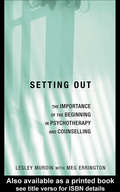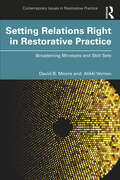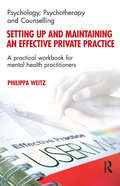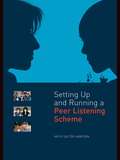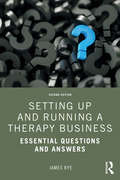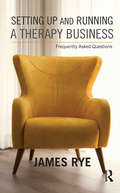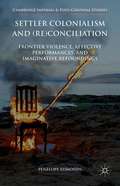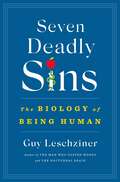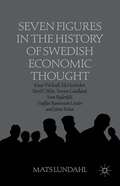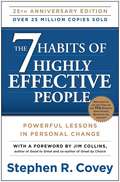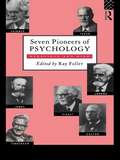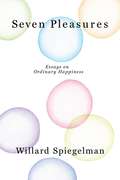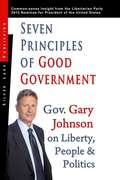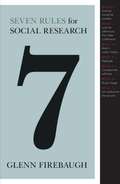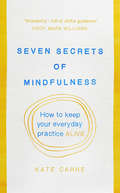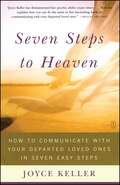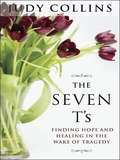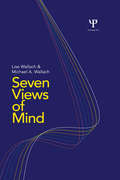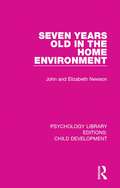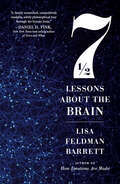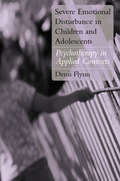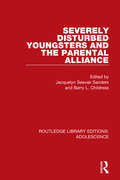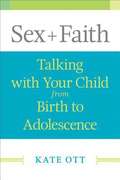- Table View
- List View
Setting Out: The Importance of the Beginning in Psychotherapy and Counselling
by Lesley Murdin Meg ErringtonThe nature and the outcome of therapy are always to some extent determined by the way the therapist decides to conduct the initial session. In Setting Out Lesley Murdin and Meg Errington explore the issues surrounding this subject, providing valuable insights into the significance of beginnings in psychotherapy. The book deals with practical issues for the therapist, such as the responsibility for the unfolding of the therapeutic relationship. It also addresses ethical and technical debates over how much should be said at the initial meeting, and how the beginning can determine the outcome. Subjects covered include: *The birth of a narrative self *Diagnosis: should we even begin? *Expectations: the birth of pattern recognition *Transference: the birth of the problem of reality Illustrated throughout with case vignettes, this exploration of the crucial issue of how to manage beginnings will be prove an invaluable resource for students of counselling and psychotherapy as well as experienced practitioners.
Setting Relations Right in Restorative Practice: Broadening Mindsets and Skill Sets (Contemporary Issues in Restorative Practice)
by David B. Moore Alikki VernonSetting Relations Right in Restorative Practice is a practical guide to using restorative processes, both in justice systems, to provide a healing response to harm, and in broader community contexts, to help people co-exist peacefully. Restorative processes can help to establish, maintain, deepen, and repair relationships, and to neutralise the conflict associated with negative relationships. The result is less conflict within people, between people, and between groups, and increasing individual and community wellbeing. These complex goals can be distilled to the single principle of setting relations right. The authors distil lessons from their decades of work at the frontline of restorative innovation. They outline an accurate, accessible theory that informs a restorative mindset, and describe in detail the corresponding skill set. Succinct, engaging case studies include refinements to existing programs in justice systems. Other case studies include the innovations of restorative responses to institutional abuse and to family violence and sexual harm, initiatives to increase psychological safety in schools and workplaces, and programs that support restorative ways-of-working across whole cities or regions. By applying elements from successful programs, practitioners can realise the broader reforming potential of restorative practice. This book is essential reading for restorative practitioners, administrators, and policymakers, for students and researchers – indeed, for anyone interested in the power and potential of restorative practice and other forms of deliberative decision-making.
Setting Up and Maintaining an Effective Private Practice: A Practical Workbook for Mental Health Practitioners
by Philippa WeitzCounsellors, psychotherapists and psychologists are proud to belong to the helping professions. Those working within these professions see themselves as caring people trying to help others to understand themselves better, to feel better about themselves, and to help them get over various traumas and difficulties that they have experienced either within their lives or personalities. Talking about money and thinking of their clients, and the units of therapy time, as items of income can be uncomfortable. Many counsellors, psychotherapists and psychologists may not easily view their private practice as a business. But that is what it is and the primary role of any business is to be profitable. In this volume, the author guides us through practicalities of setting up and maintaining a private practice, and addresses the tensions and problems faced by the practitioner trying to both provide care and run an effective business. The author provides clear models and examples that practitioners will be able to adapt to their own circumstances, for example showing them how to set up accounts.
Setting Up and Running a Peer Listening Scheme
by Kathy SalterMany children and young people in our schools are in need of someone to talk to. They have problems at home, difficulties with school work, or find that, for whatever reason, they just don’t ‘fit in’. A sympathetic listener who can offer some support can make all the difference. There isn’t a school in the land that wouldn’t benefit from a well-run peer listening scheme – here is the ‘how to do it’ guidance that will help busy practitioners to put in place something that really works.
Setting Up and Running a Therapy Business: Essential Questions and Answers
by James RyeSetting Up and Running a Therapy Business provides a succinct, practical, and accessible guide for counsellors starting out in private practice as well as for more experienced practitioners who would like advice on how to continue to attract a larger clientele. This second edition has been restructured to bring all the marketing chapters together to help counsellors understand a variety of ways of helping their business grow, and includes new material on using social media. Through the inclusion of topics such as setting up a website, choosing an ideal workplace, marketing, meeting data storage standards (including new material on GDPR), and methods of accepting payments, the author offers his expertise and guidance to help practitioners make wise, workable decisions based on a thorough understanding of the stakes as well as the viable options. As a book that bridges the gap between being a good counsellor and running a successful counselling business, it is a comprehensive read not only for counsellors who are just starting in private practice, but also for senior practitioners seeking a fresh perspective on their business.
Setting Up and Running a Therapy Business: Frequently Asked Questions
by James RyeThis book answers the questions that therapists frequently ask about setting up and running a business. It allows readers to successfully make the journey from being trained in how to conduct professional therapy sessions to running a growing private practice. The material covers a range of issues including: registration with HMRC, money issues, marketing, insurance, and whether to work from home or other premises. The book addresses a number of practical questions, such as: Do I have to register with the information commission? What can I count as legitimate business expenses? What mistakes should I avoid when marketing my practice? How can I easily and cheaply accept card payments from my clients? What help can I get to manage my phone calls? How can I get a website? and, What can I do to increase my personal safety?As counselling in the twenty-first century changes, an increasing number of therapists are using technology to write and store notes, and to communicate with clients - either to arrange appointments, or to conduct them.
Settlement, society and cognition in human evolution
by Francis Wenban-Smith Fiona Coward Robert Hosfield Matt PopeThis volume provides a landscape narrative of early hominin evolution, linking conventional material and geographic aspects of the early archaeological record with wider and more elusive social, cognitive and symbolic landscapes. It seeks to move beyond a limiting notion of early hominin culture and behavior as dictated solely by the environment to present the early hominin world as the outcome of a dynamic dialogue between the physical environment and its perception and habitation by active agents. This international group of contributors presents theoretically informed yet empirically based perspectives on hominin and human landscapes.
Settler Colonialism and: Frontier Violence, Affective Performances, and Imaginative Refoundings (Cambridge Imperial and Post-Colonial Studies)
by Penelope EdmondsThis book examines the performative life reconciliation and its discontents in settler societies. It explores the refoundings of the settler state and reimaginings of its alternatives, as well as the way the past is mobilized and reworked in the name of social transformation within a new global paradigm of reconciliation and the 'age of apology'.
Seven Deadly Sins: The Biology of Being Human
by Dr. Guy LeschzinerA FINANCIAL TIMES BEST BOOK OF THE YEARSeven Deadly Sins will explore the underlying nature of the seven deadly sins, their neuroscientific and psychological basis, and their origin in our genes.Gluttony. Greed. Sloth. Pride. Envy. Lust. Anger. These are The Seven Deadly Sins, the vices of humankind that define immorality. But do these sins really represent moral failings, or are they simply important and useful biological functions that humans need to survive? Instead of being acts of immorality, are they really just a result of how our bodies, our psyches, and our brains in particular, are wired? In Seven Deadly Sins: The Biology of Being Human, Guy Leschziner, a professor of neurology, dares to turn much of what society thinks of as morality on its head and to ask these controversial questions.Leschziner takes readers on an exploration of the Seven Deadly Sins as he looks at their neuroscientific and psychological bases, their origin in our genes, and, crucially, how certain medical disorders may give rise to them. He introduces us to patients whose physical and psychological conditions have given rise to behaviours that have for centuries been labelled as “sin” and how these behaviours might actually be evolutionary imperatives that preserve the tribe and ensure the wellbeing of our societies. In Seven Deadly Sins, a book certain to cause debate and raise controversy, Guy Leschziner, a writer who has explored the mysteries of our sleeping brains and the odd crossed wires of our five senses, asks whether these traits truly represent sin, or simply reflect our intrinsic drive to survive and thrive.
Seven Figures in the History of Swedish Economic Thought
by Mats LundahlWho are the greatest economic thinkers of Sweden? Seventeen essays on seven Swedish economists aim to answer this question, exploring the contributions of Knut Wicksell, Eli Heckscher, Bertil Ohlin, Torsten G#65533;rdlund, Sven Rydenfelt, Staffan Burenstam Linder and Jaime Behar. Swedish academic economists have by and large withdrawn from the public debate but this book celebrates Swedish Economic Thought from Knut Wicksell to the present.
Seven Habits of Highly Effective People: Powerful Lessons in Personal Change
by Stephen R. CoveyOne of the most inspiring and impactful books ever written, The 7 Habits of Highly Effective People has captivated readers for 25 years. It has transformed the lives of Presidents and CEOs, educators and parents— in short, millions of people of all ages and occupations.
Seven Pioneers of Psychology: Behaviour and Mind
by R. FullerIn this exciting new volume, six of the world's leading scholars write about the contribution made to our understanding of human behaviour and the human mind by seven great figures of the last 100 years: Lorenz and Tinbergen, Skinner, Piaget, Freud, James and Galton. Their seminal work on ethology, behaviourism, child development, psychoanalysis, perception and heredity provide the basis for much of today's psychological thinking and research. An account of the thought of each key figure is given together with a brief biography. Each contribution is written so that is can be understood by anyone interested in ideas of these major figures. Based on a series of lectures given at Trinity College, Dublin, Seven Pioneers of Psychology provides a clear, accessible and extremely readable account of seven of the great pioneers in exploring the human condition.
Seven Pleasures: Essays on Ordinary Happiness
by Willard SpiegelmanSpiegelman takes a look at the possibilities for achieving ordinary happiness without recourse to either religion or drugs. In this erudite and frequently hilarious book of essays, he discusses seven activities that lead naturally and easily to a sense of well-being.
Seven Principles of Good Government: Insights from the 2012 Libertarian Party Nominee for President
by Gary JohnsonGary Johnson is the former two-term governor of New Mexico. He made headlines during his tenure as governor for supporting school vouchers, a freeze on all taxes, real cuts in government agency funding and the decriminalization of marijuana. In 2012, he is running for President of the United States on the Libertarian Party ticket. He will be campaigning aggressively through the fall in all 50 states.
Seven Rules for Social Research
by Glenn FirebaughSeven Rules for Social Research teaches social scientists how to get the most out of their technical skills and tools, providing a resource that fully describes the strategies and concepts no researcher or student of human behavior can do without. Glenn Firebaugh provides indispensable practical guidance for anyone doing research in the social and health sciences today, whether they are undergraduate or graduate students embarking on their first major research projects or seasoned professionals seeking to incorporate new methods into their research. The rules are the basis for discussions of a broad range of issues, from choosing a research question to inferring causal relationships, and are illustrated with applications and case studies from sociology, economics, political science, and related fields. Though geared toward quantitative methods, the rules also work for qualitative research. Seven Rules for Social Research is ideal for students and researchers who want to take their technical skills to new levels of precision and insight, and for instructors who want a textbook for a second methods course. The Seven Rules There should be the possibility of surprise in social research Look for differences that make a difference, and report them. Build reality checks into your research. Replicate where possible. Compare like with like. Use panel data to study individual change and repeated cross-section data to study social change. Let method be the servant, not the master.
Seven Secrets of Mindfulness: How to keep your everyday practice alive
by Kate Carne'WONDERFUL...FULL OF SKILFUL GUIDANCE...A LIFELINE' Prof Mark WilliamsMindfulness remains as popular as ever. Yet those who are drawn to it may face challenges such as lack of time, physical pain, anxiety, depression or uncertainty. In this ground-breaking book, Kate Carne shows how to deal with the many problems that can arise, and offers practical solutions to help you overcome obstacles and deepen your practice. Combining personal stories, grounded advice and insights drawn from Kate Carne’s own professional and personal experience, as well as the experience of the many people she has taught over the years, this unique book is essential reading for anyone who has ever been drawn to mindfulness, but who – in spite of the best of intentions – finds themselves struggling to keep going after their initial enthusiasm has waned.
Seven Steps to Heaven: How to Communicate with Your Departed Loved Ones in Seven Easy Steps
by Joyce KellerSay Good-bye One More Time Have you ever experienced a breeze in a closed room? A brush on the cheek when no one is there? A whisper that sounds like the voice of someone who has passed away? Perhaps it is coincidence or perhaps it is the beginning of spirit communication. In Seven Steps to Heaven noted psychic Joyce Keller clears up misconceptions about the afterlife and reveals the various ways in which those who have crossed over make contact with us. With clarity and compassion she shares for the first time her successful Connection Technique that makes it possible for anyone to bridge the divide between the living and the dead. Developed over a period of twenty years, Keller's Connection Technique involves seven simple and safe tools: angels and spirit teachers prayer and affirmations meditation dreams a spirit space sound a labyrinth Seven Steps to Heaven offers comfort and hope to everyone who has experienced the profound loneliness and sadness that comes with the death of a family member, a dear friend, or a pet.
Seven T's, The
by Judy CollinsDrawing on her own experience of losing her son to suicide, as well as her conversations with hundreds of people who have grieved the tragic death of a friend or family member, revered singer-songwriter Judy Collins has culled 7 powerful steps toward healing: Truth (tell it), Trust (allow it), Therapy (get it), Treasure (hold on to your loved one), Thrive (look up and don¿t give in to the temptation to use alcohol or any other addiction to blunt your sadness), Treat (nurture yourself), and Transcend (live a life of joy, abundance, and forgiveness). Bill Moyers praises this book: ¿There is no return from the depths of grief that does not begin with the truth. Judy has written a book that will light the way back for any who take her hand and sing with her in the dark. ¿
Seven Views of Mind
by Lise Wallach Michael A WallachA CHOICE Outstanding Academic Title 2013! This book examines seven different answers to the question, "What are we talking about when we talk about the mind?" It begins by considering the dualistic view, frequently taken for granted by students, that words like "belief," "anger," and "jealousy" refer to a realm quite distinct from the physical world, and notes the difficulties associated with this view as well as why many find it compelling. The book then describes six further major views of mind alternative to dualism that have been developed by psychologists, philosophers, and neuroscientists: Some claim that such words are just about behavior. Some claim that such words are theoretical constructs, like "quarks" in physics. Some identify the mind with the brain or with a kind of program in the brain like the software in a computer. Some think there is nothing to which such words refer. Some think mental talk reflects nothing but convention. Students in psychology learn about different views of mind in various courses, but they tend to be left on their own to deal with the conflicts among them. How to conceive of mind is usually addressed in the context not of psychology but of philosophy, where it tends to be treated in ways that may seem esoteric to psychology students. Seldom discussed in one place, this book presents all seven views and the reasons for and against each in a relatively nontechnical, informal manner designed to appeal to psychology students and their instructors, permitting comparisons and possible resolutions.
Seven Years Old in the Home Environment (Psychology Library Editions: Child Development #9)
by Elizabeth Newson John NewsonJohn and Elizabeth Newson’s long-term investigation of child up-bringing attracted intense interest from its earliest beginnings: ‘pathbreaking’ and ‘seminal’ were adjectives that greeted their first report. The study is now established as one of the major projects of the seventies. This third volume of the series catches some seven hundred Nottingham children at a critical stage of their development: in transition from infant to junior school, they are moving out of the protective family orbit and into the wider social world of street, playground and classroom, where cultural pressures make themselves felt in ever more demanding ways. Like the Newson’s earlier books, this study has a strong ecological flavour in the sense that what children do, what parents do, and how they feel about what they do, are all set firmly into the broader context of life as it is lived in contemporary urban society. This is no laboratory investigation. Yet a sensitive and subtle methodology has allowed the Newsons to present an impressive structure of hard factual data, while putting flesh on the statistical bones by constant reference to the mothers’ own thoughts and reactions, faithfully recorded in their own vivid words. The result is a rich descriptive picture of seven-year-olds and their family life: their play, friendships, quarrels; their duties and privileges; their fears, fantasies and jokes. Inevitably, much of the book explores the dynamics of conflict between mother and child, and takes a long hard look at the domestic power-game as it is expressed in both words and punishment. At the same time, the loving and caring side of the relationship is closely and delicately examined with a rare empathy for both parent and child. In short, this is a study in depth and in breadth of how parents and children bring each other up. Teachers, doctors, nurses and social workers, as well as parents welcomed the Newsons’ earlier reports. Once again, no professional worker in the field of childhood or parenthood can afford to be without the insights offered by this volume, which is also a rich source of enjoyment for any observer, professional or amateur, of the family in society today. Today it can be enjoyed in its historical context.
Seven and a Half Lessons About the Brain
by Prof. Lisa Feldman BarrettFrom the author of How Emotions Are Made, a myth-busting primer on the brain in the tradition of Seven Brief Lessons on Physics and Astrophysics for People in a Hurry. Have you ever wondered why you have a brain? Let renowned neuroscientist Lisa Feldman Barrett demystify that big gray blob between your ears. In seven short essays (plus a bite-sized story about how brains evolved), this slim, entertaining, and accessible collection reveals mind-expanding lessons from the front lines of neuroscience research. You'll learn where brains came from, how they’re structured (and why it matters), and how yours works in tandem with other brains to create everything you experience. Along the way, you’ll also learn to dismiss popular myths such as the idea of a &“lizard brain&” and the alleged battle between thoughts and emotions, or even between nature and nurture, to determine your behavior. Sure to intrigue casual readers and scientific veterans alike, Seven and a Half Lessons About the Brain is full of surprises, humor, and important implications for human nature—a gift of a book that you will want to savor again and again.
Severe Domestic Squalor
by John Snowdon Graeme Halliday Sube BanerjeeShould you intervene in the life of the 48-year-old woman whose dwelling is stuffed with accumulated rubbish and who will not let anyone help get rid of it - or the 78-year-old surrounded by putrescent food and filth - or the 'animal accumulator'? Cases of severe domestic squalor (sometimes called Diogenes Syndrome) are among the most complex and difficult faced by community agencies. Local councils, housing officers, health professionals, social services, animal welfare agencies, public guardians and of course relatives and neighbours often feel powerless and lack confidence about what to do when faced with such situations. The guidelines, recommendations and case examples in Severe Domestic Squalor will help concerned people to understand what can be done and how, by providing an understanding of the causative factors and who should take the lead in dealing with them.
Severe Emotional Disturbance in Children and Adolescents: Psychotherapy in Applied Contexts
by Denis FlynnSevere Emotional Disturbance in Children and Adolescents conveys the experiences of severely emotionally disturbed children in detailed accounts of psychoanalytic psychotherapy, and explores the life and death struggles against severe self-harm to body and mind by the most distressed sections of adolescents. Illustrated by clinical material, chapters cover subjects including:* the inpatient therapeutic setting* family rehabilitation after physical, sexual and emotional abuse* the adoptive father* work with adolescent inpatients with spina bifida* assessment, treatment and clinical management of adolescent disturbance. Severe Emotional Disturbance in Children and Adolescents underlines the value of intensive psychoanalytic psychotherapy as a coherent method of treatment in even the most severe cases of emotional disturbance. Psychotherapists, mental health workers, and social workers will find it a valuable resource for difficult work in a variety of contexts.
Severely Disturbed Youngsters and the Parental Alliance (Routledge Library Editions: Adolescence #8)
by Jacquelyn Sanders Barry ChildressOriginally published in 1992 this was a much-needed book that shows how important it is to establish a therapeutic alliance with the parents of severely disturbed young people in order to improve the success of counseling with them. It also explores methods of how to ease the difficulties encountered in establishing such a relationship with the parents or guardians. In this title, the insights of psychoanalysis are used to understand reactions to parents and to develop an empathic approach to them through a new theoretical framework. Although in the popular view, a psychoanalytic approach is considered to be opposed to parents, this volume is testimony to the unique contribution such an approach can make to the support of parents and, thereby, their children. A major and unique emphasis of Severely Disturbed Youngsters is placed on exploring the feelings, reactions, and sensitivities of the therapist that can interfere with this important aspect of treatment. The thrust of the book is to put the understanding of this interference in a theoretical context and to indicate ways of coping with the interference.
Sex + Faith
by Kate OttTalking with your child about sex can be scary! Sex + Faith helps parents incorporate their faith values with sexual information so they can answer questions, discuss sexuality at each stage of childhood, and show support of sexual differences. Section one explains how faith relates to sexuality and the essential role parents play in forming healthy, faithful, sexual children . The second section designates a chapter for four age groupings of children from infancy through high school. Each chapter explains the biological and developmental issues of the age, answers questions children tend to have, provides relevant Biblical and faith stories helpful to discuss with children of that age, and lists five to ten key educational issues for parents to keep in mind. Shaded text boxes are interspersed throughout the book with real life, practical questions that parents and children ask. Expertly written by Kate Ott, Sex + Faith is an easy to use reference guide for parents of kids of all ages.
